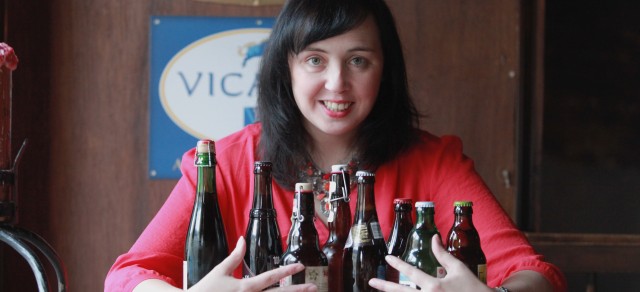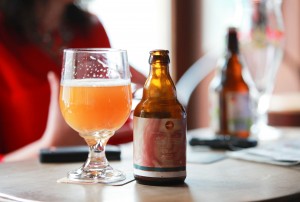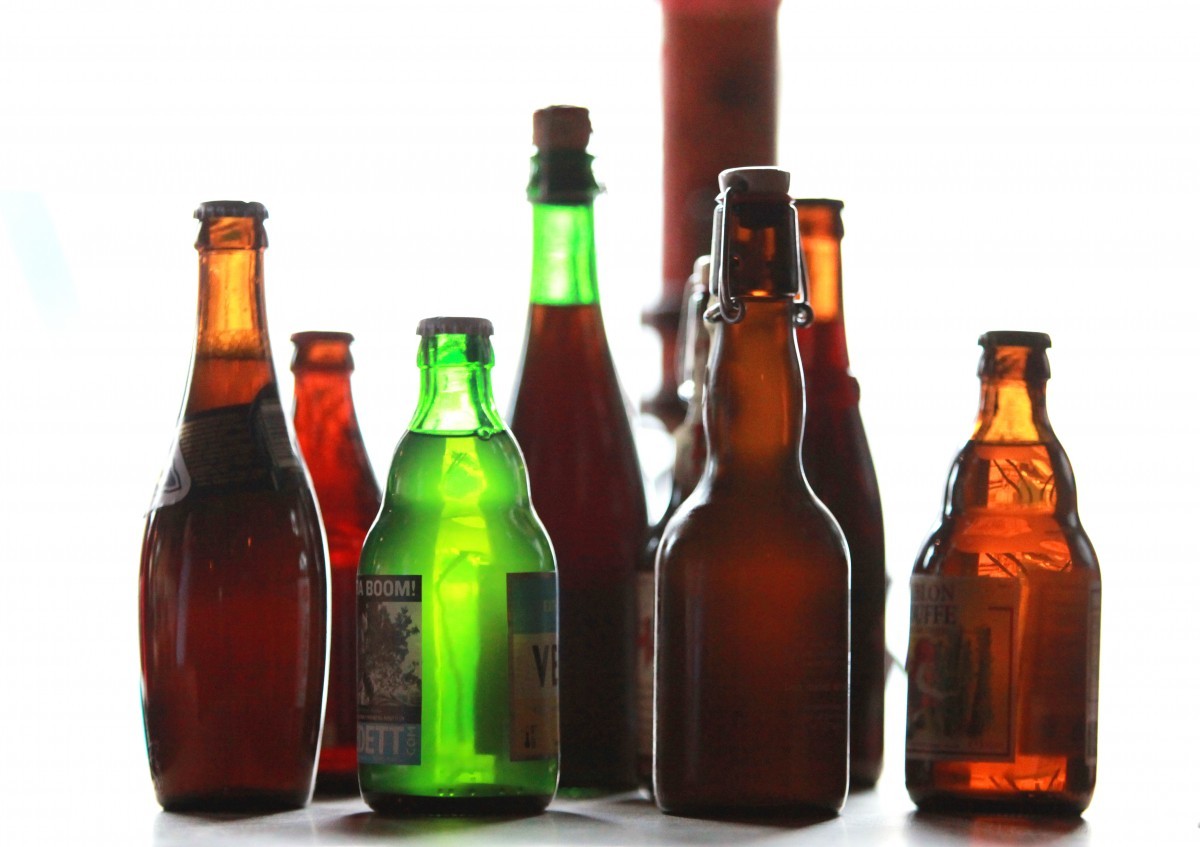Why do not all women drink beer? That may sound like a naive question, but it isn’t. It is a popular misconception that women don’t like beer. “Brewing is something you do with passion,“ says Belgian beer sommelier Sofie Vanrafelghem –yes, a woman- taking another sip from her beer glass. “Combining a limited amount of basic products -barley, hops and wheat- you create a wide range of flavours. The result is a balanced, refined flavour, preferably with some fresh and fruity touches. What ‘s more feminine than that?”

Sofie has had her fair share of experiences with the persistent prejudices about beer and women. She comes from a traditional family, where every occasion, big or small, was a reason to raise the glass. The wineglass, that is. “My dad had an impressive wine cellar. He taught me everything about the finesses of wine tasting, of preserving, of the rich artisan culture. I never imagined there could be another divine drink. Certainly not beer.”
Until one day, when she was a student in Ghent, and unexpectedly looked deep into a full glass of Orval. She felt like she was giving her first kiss: slowly, initially slightly suspicious, she moved closer, taking careful sips and inhaling the aromas. Then taking a more generous gulp. With lots of foam. And then there was no way back: lightning stroke and her love for beer would never go away. “The first taste was so overwhelming I immediately thought: why hasn’t anybody told me about this before? Wine is all right, but this is something else, something better! From then on I knew: I’m quitting my wine sommelier training. I want to brew beer.”
Women and brewing
Soon after that, during her final year Communication Studies, Sofie got the opportunity to write a book about beer. She decided to investigate where the prejudice about women and beer comes from. For history tells us that women and brewing are made for each other.
The earliest written traces of beer were found on 6000 year old Sumerian clay tablets where we see two people drinking beer with a straw. Other early traces include clay tablets dating from 2500-2200 BC, written in cuneiform and found in the ancient city of Ebla, Syria, that said: “Drink Ebla, the beer with the heart of a lion.” Not only were the majority of brewers women at that time, it was also the only craft that had a tutelary goddess, called Ninkasi.“

So history is on our side, but is it possible that beer has lost its quality and refinement over the ages? And could women have lost interest because of that? Wrong again! According to Sofie especially Belgian beer has a huge number of assets that appeal to women. Think about balance and subtlety, two typical characteristics of Belgian beers. “I don’t understand why there aren’t more women who surrender to the charm and richness of beer. For years I have been fighting persistent prejudices, such as beer makes you fat and the flavour range of beer is not as rich as that of wine: nonsense! Fortunately more and more women are persuaded to give beer a chance. During exclusive women-only beer tastings, it turns out that women even like strong beers with a typical beer taste. They discover that they appreciate fruity flavours, like citrus and grapefruit. These flavours can be found in Eva, the beer I brewed myself. We’ve organized a lot of these tastings and it has strengthened my opinion that women are looking for balance in a beer. After the tastings women often tell me how surprised they are they didn’t discover those rich flavours sooner. Just like I was after my initial encounter with that glass of Orval. So it’s really just a matter of time.”
Belgian balance
The balance that makes women surrender to beer is exactly what makes Belgian beer stand out from the rest. A beer that is not crafted as it should is instantly recognisable because the taste is dominated by one specific herb or flavour. “US brewers tend to make that mistake as well, when they’re trying to copy our splendid old Geuze. Sometimes you smell the acetic acid from miles away. That approach just doesn’t work over here. We add extra flavour to a beer in order to obtain a less bland, much richer and balanced taste.”

Not only the rich taste, but also the rich history of beer adds an extra dimension to Sofie’s love of the beverage. Her father was full of stories about wine, she passionately dives into the history of the many Belgian breweries. “We have the rich heritage of Trappist beers for instance. Their story begins during the French Revolution, when many monks fled across the border as a result of the harsh climate against clergymen. The hardworking monks found a new home in our part of the world and clever as they were they took over the local tradition of brewing with barley and wheat to cover their living expenses and quench their thirst. Many clergymen on the run followed their example and came to our country as well. As a result of that six out of the eleven Trappist breweries have their roots in Belgium. Today there are 170 breweries in our country, producing nearly 3000 unique beers. That’s without the home-brewers. We should be proud of that.”
Under pressure?
The patience and experience of the monks played a crucial part in the history of Belgian beer brewing. No doubt they added balance and full flavours to their brew, the main characteristics of Belgian beer that makes tasting to sommelier Sofie quite a challenge. “I studied brewing and then obtained a degree as beer connoisseur or zythologist, but I feel I’m still a student. Pouring a draught beer correctly, serving it correctly, store it at the right temperature … It’s really not that simple. The tap is extremely important. What’s the perfect pressure? How do you maintain the kegs and the tubes? To keep the subtle balance of beer every detail is important. Beer often has a much wider range of aroma’s then wine. Beer can be as complex as a fine Bordeaux. In restaurants sommeliers serve beer in a neutral, open glass so the elegant aromas and flavours can be fully appreciated. In doing that you really put beer at the same level as wine and that is what beer deserves!”
Café Belge
Sofie’s knowledge led to a wonderful concept: bar and restaurant Café Belge. Sofie helped launch the first one in Dubai, and still assists the team as the master beer sommelier. Everything there celebrates refinement and good taste “Our slogan Beer is grand cru shows that all beers are poured and served under the best circumstances. Off course we also serve Belgian food, an extra taste experience. Café Belge was an instant success and is full every day. Men ànd women enjoy the best beer together at a richly filled table. What’s not to like?”

